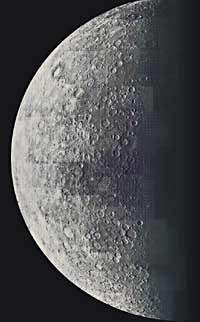Mercury has a liquid heart

Mercury has a magnetic field, so we could use the compass. But it should be a very precise compass, as the Mercury area is one hundred times weaker than the Earth's. In fact, scientists did not know what created this small area and have had to measure the rotation of the planet to conclude that it contains liquid iron inside.
About thirty years ago, the Mariner 10 probe measured Mercury's magnetic field. Astronomers did not think it existed, but although it is weak, the probe found it. This meant that the planet should have liquid iron in the area, which is what happens on Earth and on Venus. The magnetic field is the result of the rotation of the liquid iron.
However, in the case of Mercury it was a very weak area, perhaps too weak for liquid iron to be produced. Astronomers proposed another explanation, that the mantle of Mercury could be the origin of this area. But a group of American astronomers presented in December in San Francisco data in favor of the liquid heart hypothesis. Mercury's rotation was measured with great precision and did not find the behavior of a totally solid planet. They say the only explanation is that Mercury has a liquid heart.





